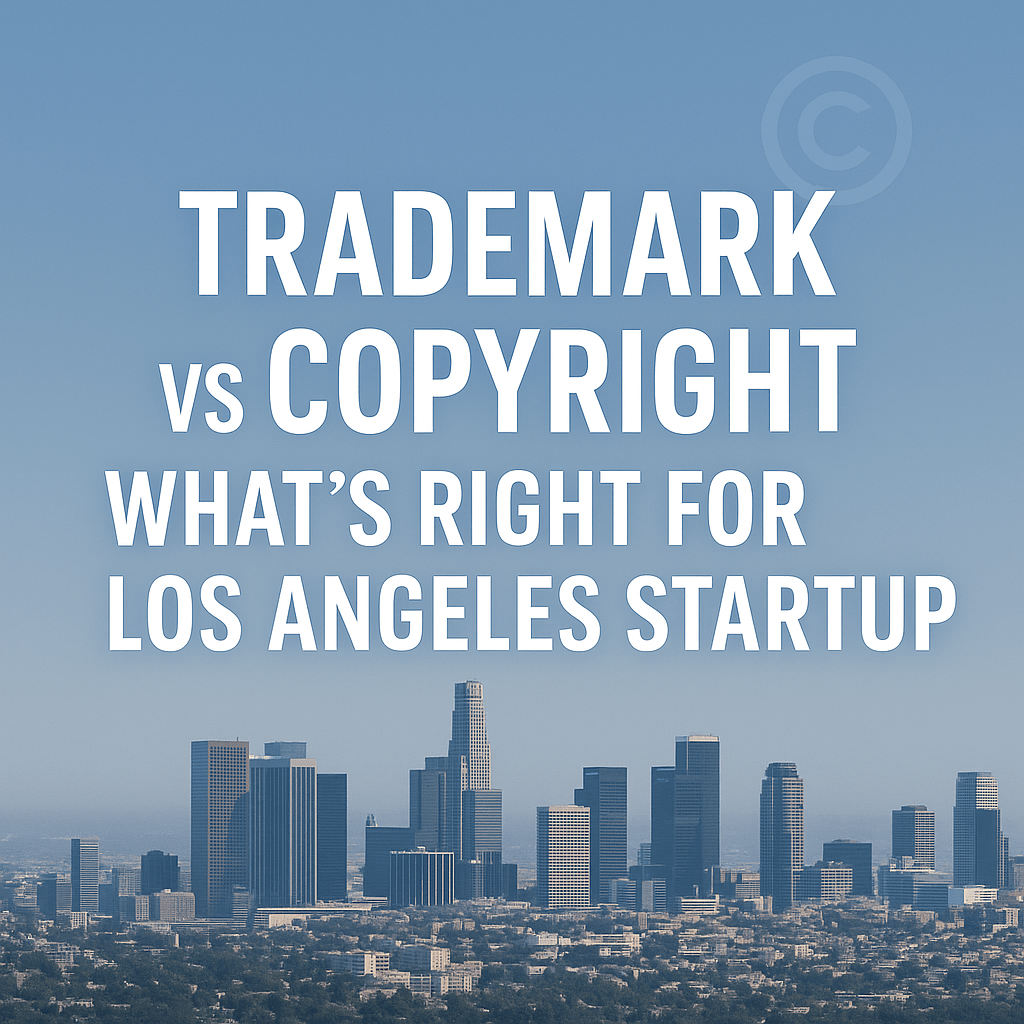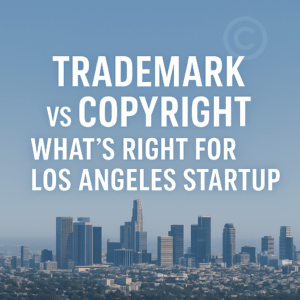Los Angeles is a hotbed of innovation, creativity, and rapid startup growth. Whether your company builds apps, produces digital content, or develops consumer products, intellectual property (IP) protection can determine how defensible your business is as it scales.
Two of the most commonly misunderstood forms of IP protection are trademarks and copyrights. Founders often use these terms interchangeably, but they serve very different purposes, and choosing the right one at the right time can prevent costly legal mistakes.
Understanding the Basics: Trademark vs Copyright
What Is a Copyright?
Copyright protection safeguards original works of authorship that are fixed in a tangible medium. This includes everything from website code and product photography to UX designs, blog posts, and digital media. Once a creative work is produced and recorded—whether in a physical or digital format—it automatically gains protection under U.S. copyright law.
For startups in Los Angeles, copyright law applies to a broad range of creative and technical assets that form the foundation of their businesses. This can include app interfaces, original software code, product manuals, digital marketing materials, videos, podcasts, or even brand photography.
Each of these creations represents intellectual property that, when protected properly, can significantly increase a company’s valuation and competitive defensibility.
The primary benefit of copyright ownership is exclusivity. It gives creators the sole right to reproduce, distribute, display, and create derivative works from their original content. From entertainment to SaaS, these rights form a crucial layer of legal defense against unauthorized use, imitation, or theft of digital assets.
What Is a Trademark?
While copyright protects creative expression, trademark law safeguards brand identity. A trademark can include names, logos, slogans, or even sounds that distinguish one company’s goods or services from another. These identifiers are the core of how the market perceives your business.
In practical terms, trademarks arise through use in commerce, but registration with the U.S. Patent and Trademark Office (USPTO) substantially strengthens those rights.
Registration provides nationwide protection, public notice of ownership, and the ability to use the ® symbol—all of which deter competitors and enhance brand credibility.
For Los Angeles startups, a trademark can apply to company names, app titles, taglines, or domain names used commercially.
Protecting these identifiers not only reduces confusion in the marketplace but also signals professionalism and maturity to investors. A strong, registered trademark often translates to a more valuable and trustworthy brand.
Key Differences at a Glance
- Purpose: Trademarks protect brand identity; copyrights protect creative expression.
- Duration: Copyright lasts for the author’s life + 70 years; trademarks can last indefinitely with proper maintenance.
- Scope: Copyright covers the creative substance; trademark covers the source of goods/services.
- Overlap: Some works—like a logo—may qualify for both protections.
Why This Matters for a Los Angeles Startup
In a city that thrives on creativity and innovation, intellectual property protection can make or break a startup’s trajectory. Los Angeles founders often work at the crossroads of technology, entertainment, and media industries, where copyright and trademark infringement risks are high.
A mobile app, for example, may involve copyrighted source code and a trademarked brand name. A content-driven company might depend on copyrighted videos and a trademarked logo. Without proper protection, these assets remain vulnerable to copycats, brand conflicts, and legal disputes that can disrupt funding or acquisitions.
Investors and acquirers routinely evaluate IP portfolios during due diligence. Missing registrations, unprotected assets, or brand conflicts can reduce valuation and stall deals. By securing both copyright and trademark rights early, startups establish credibility and long-term defensibility within competitive markets
 Step-by-Step: How to Decide Which Protection You Need
Step-by-Step: How to Decide Which Protection You Need
Step 1 – Identify What You’re Protecting
- Brand identifiers (name, logo, slogan) → Trademark
- Creative works (designs, written code, videos, music) → Copyright
Many startups need both protections.
Step 2 – Consider Registration vs Common Law
- Copyright arises automatically → registration strengthens enforcement
- Trademark gains rights through use → federal registration grants nationwide protection and ® use
Early registration prevents future risks.
Step 3 – Search & Clearance
Before brand launch or asset publication:
- Trademark: run a clearance search to prevent disputes
- Copyright: ensure originality—avoid unauthorized use
Step 4 – Register (If Applicable)
- Trademark: File with USPTO (6–12 months)
- Copyright: U.S. Copyright Office (typically quicker)
Attorney support ensures filings meet legal standards.
Step 5 – Maintain & Enforce Your Rights
IP protection is ongoing:
- Monitor the marketplace for infringement
- Track licensing agreements
- Renew and enforce registrations
Smart startups build proactive systems—not reactive defenses.
Common Mistakes LA Startups Make & How to Avoid Them
Mistake 1 – Assuming a Domain Name Equals Trademark Protection
Domains ≠ trademark rights.
Mistake 2 – Delaying Registration
Early filing prevents conflicts and forced rebranding.
Mistake 3 – Using Unvetted Contractors Without IP Transfer
Always secure work-for-hire agreements.
Mistake 4 – Ignoring IP During Investor Due Diligence
Missing registrations can reduce valuation and deal momentum.
Mistake 5 – Overreliance on Copyright Alone
Brand identity still needs trademark protection.
Treat IP as equity—because investors do.
When You Might Need Both Trademark and Copyright
Many startups qualify for dual protection:
- A creative logo qualifies as both a copyrighted design and a trademarked brand identifier
- Software includes copyrighted code and trademarked branding
- Content-first startups protect both the art and the brand
Benefits of protecting both:
- Stronger enforceability
- Safeguards creative + commercial value
- Increased licensing and investor leverage
Practical Next Steps for Your Startup in Los Angeles
A simple roadmap to protect what you’re building:
- Create an IP inventory
- Verify ownership of all created work
- Conduct clearance searches
- File strategic registrations
- Track renewals
- Monitor for infringement
- Work with IP counsel aligned with startup growth
L.A. Tech & Media Law Firm supports founders through audits, filings, clearances, and strategic IP planning tailored to growth milestones.
Secure Your Startup’s Future: Protect Your Brand and Creative Assets Now
For Los Angeles startups, trademark vs copyright isn’t an either/or choice.
- Trademarks guard your identity
- Copyrights protect your creativity
Securing both early prevents disputes, strengthens valuation, and ensures your innovation scales safely.
David Nima Sharifi, Esq., founder of the L.A. Tech and Media Law Firm, is a nationally recognized IP and technology attorney with decades of experience in M&A transactions, startup structuring, and high-stakes intellectual property protection, focused on digital assets and tech innovation. Quoted in the Wall Street Journal and recognized among the Top 30 New Media and E-Commerce Attorneys by the Los Angeles Business Journal, David regularly advises founders, investors, and acquirers on the legal infrastructure of innovation.
Schedule your confidential consultation now by visiting L.A. Tech and Media Law Firm or using our secure contact form.



